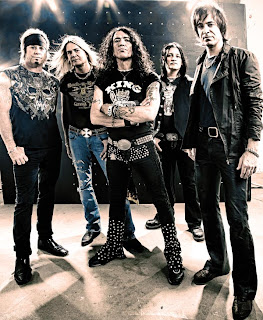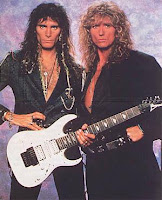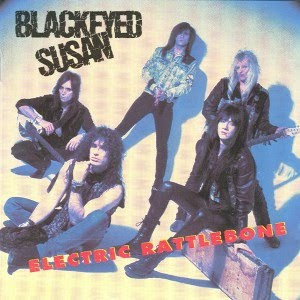Ratt are back and sounding better than ever with Infestation (Loud & Proud/Roadrunner), their first album of new music in 11 years.
 With three-fifths of the band's classic lineup -- singer Stephen Pearcy, guitarist Warren DeMartini and drummer Bobby Blotzer -- still intact and some new blood injected into the band, it's no wonder the Los Angeles veterans are in particularly rare form on this latter-day hair metal classic.
With three-fifths of the band's classic lineup -- singer Stephen Pearcy, guitarist Warren DeMartini and drummer Bobby Blotzer -- still intact and some new blood injected into the band, it's no wonder the Los Angeles veterans are in particularly rare form on this latter-day hair metal classic. Robbin Crosby is, of course, RIP, while original bassist Juan Croucier has long been MIA and has since been replaced by four-stringer Robbie Crane. Joining the fold to give the band a dual-guitar attack is Quiet Riot guitarist Carlos Cavazo.
Having two legendary six-stringers like DeMartini and Cavazo in the studio must have presented at least some temptation to producer Michael Baskette (Limp Bizkit, Chevelle, Incubus) to push the guitars way up in the mix at the expense of the rhythm section. But that's not the case.
Sure, the guitars and vocals jump out at you, but Crane and Blotzer also stand out with a clean, clear rhythm presence. This is one record that you can actually hear the bass on! In fact, Baskette's studio style recalls the crisp production work on 1986's Dancing Undercover -- the last truly stellar Ratt record.
Below is a track-by-track review of Infestation.
1. Eat Me Up Alive
Infestation opens with an irrepressible blast of a song that almost borders on '80s power metal in the vein of Judas Priest. Pearcy's threatening opening lyrics -- "Tell me all your secrets now / as I lay you on the bed" -- recall Priest's "Eat Me Alive."
There's even a breakdown at 2:15 that's reminiscent of the one in Priest's "The Sentinel." Pearcy engages in some brief Halford-ian wordplay during the breakdown and then DeMartini and Cavazo use the solo to trade barbed-wire licks like they're Glenn Tipton and K.K. Downing.
Who would've thought Ratt had a Defenders of the Faith moment in them?!

2. Best of Me (Metal Mixtape favorite!)
After the Birmingham, England-like metal blight of "Eat Me Up Alive," we go straight to sunny California's Sunset Strip for this stellar single.
From the moment the chunky, melodic riffing of the song's intro kicks in with a sublime DeMartini lead over top, you know you're in for something memorable. It's the kind of music that can appeal to longtime fans without sounding like a retrospective rehash. It's amazing that this storied L.A. act can sound this good after all these years.
3. A Little Too Much
Another energetic number that contains some of the most dense guitar shredding of the record. This is a tough trash-talking rocker. Love that tolling of the bell around 3:10, too! It's just a moment, but it's a nod to the history of the genre's roots that calls to mind AC/DC's "Hell's Bells."
4. Look Out Below
An almost "Way Cool Jr." style jam with some bounce and shuffle, and touches of wah-wah on the guitar during the hook. The band hits double-time to end this track on a high note.
5. Last Call (Metal Mixtape favorite!)
This is an almost AC/DC-like call to debauchery, with a riff that recalls the Antipodeans' "Riff Raff" filtered through the Sunset Strip. Things get loose as a goose when the bridge comes along and there's a blues shuffle à la Tora Tora before kicking into the driving hook.
The solo opens with another Priest-ish moment, as DeMartini and Cavazo hit some tandem ascending runs that conjure up Tipton and Downing all over again.
6. Lost Weekend (Metal Mixtape favorite!)
Here it is, another Holy Grail moment for the hair metal faithful. Opening with an accentuated rhythm borrowed from early Mötley Crüe, "Lost Weekend" is the real deal with big chunky slabs of melodic riffing and party-hearty lyrics that show us all how to let our hair down.
It makes Pearcy's opening question on this track -- "Are you ready for big fun?" -- a needlessly rhetorical inquiry. Ah, Stephen, we were born ready. Where were you through much of the '90s when we needed you, while most rock fans were turning into depressed coffee-drinking losers?! Welcome back, boys!
7. As Good As It Gets
Slow, sleazy grooves dominate this mid-tempo number as Pearcy pays tribute to making love to his wife. Is it just me or does Stephen's voice have an almost Lemmy-like hoarseness on this track? In fact, this song feels kind of like a slow, heavy blues that Motörhead might pull off.
8. Garden of Eden
Here the record, in my opinion, begins to hit a lull. "Garden of Eden" just doesn't seem catchy, despite the Sabbath-y stomp of the verse with its stops and starts à la "War Pigs." It's almost like Ratt trying their hand at stoner rock.
Checking in at a very short three minutes, "Garden of Eden" feels like it's missing something. What's missing, though, I can't say. But this song feels to me like it was an afterthought that would have been better as a B-side.
9. Take a Big Bite
Another raunchy rocker with some nice harmony runs from DeMartini and Cavazo in the solo. Viva la double-guitar attack of classic metal! "Take a Big Bite" reverses the dull trend that started with "Garden of Eden."
 10. Take Me Home
10. Take Me HomeThis is as close as we get to a power ballad on Infestation. "Take Me Home" has a dreamy sound, with guitars that mimic violins during the verses (think Boston's Tom Scholz on Third Stage) and nice orchestration courtesy of producer Michael Baskette to heighten the sense of drama.
Sure, it's a little left field for Ratt, but it plays nicely into the sensitive side of the bad boy stereotype that Pearcy and the band cultivate. And that's a big part of what makes the hair-metal genre so appealing to men and women alike.
11. Don't Let Go (Metal Mixtape favorite!)
At last, the final send off to a great album. "Don't Let Go" was co-written with John Corabi (Union, Mötley Crüe) and has that daring, driving guitar sound that feels big, edgy and dynamic like vintage Van Halen.
Pearcy's opening line is "I'm gonna get me some leg tonight for sure / and I don't care who I'm with." Um, when was the last time you heard anyone say that since David Lee Roth did it in "Unchained"?! That was 1981, for chrissake!
Bravo, Stephen! A heartfelt "thank you" to Ratt for making us remember the good times and creating brand-new music for us to make memories with in the future.








